Autumn
bugs
If it's a bug-free
spring you're after, it's all about controlling them in the autumn.
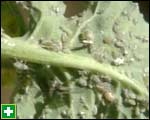 Autumn
is a key time for sorting out the bugs in your garden. Why? Because
ideally you want to have as few as possible during the winter, so
that come spring your reinfestation levels are low. Autumn
is a key time for sorting out the bugs in your garden. Why? Because
ideally you want to have as few as possible during the winter, so
that come spring your reinfestation levels are low.
Aphids can be a real
problem in the garden, from early spring to autumn. They suck nutritious
juices from the plants, and in large numbers they cause serious
deficiency symptoms. They're also well equipped to transmit plant
viruses.
At this time of the year,
aphids are in overwintering mode. That means they are busily preparing
for egg laying. But you can still grab them with the odd spray of
Conqueror Oil — a very simple mineral oil.
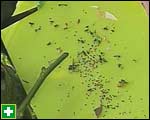 Now,
talking about oils, neem oil is another one. Beautiful organic material
— three, maybe four sprays, four or five days apart. That will
do them nicely. And, remember, neem oil is totally harmless to predators
and parasites. Now,
talking about oils, neem oil is another one. Beautiful organic material
— three, maybe four sprays, four or five days apart. That will
do them nicely. And, remember, neem oil is totally harmless to predators
and parasites.
When it gets into spring,
the first winged aphids will form, and they'll be flying around
your garden looking for a host.
Here's a clever trick.
Get some yellow sticky traps. Hang those in your roses or other
plants, and aphids are attracted to the colour yellow; they will
end up totally stuck on the sticky tape, stopping them from infesting
your plants.
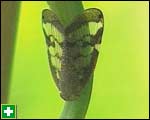 Passion
vine hoppers are sap suckers too, and cause yellowing and deficiency.
At the moment they are busy laying eggs ready for next spring, just
like the aphids. Passion
vine hoppers are sap suckers too, and cause yellowing and deficiency.
At the moment they are busy laying eggs ready for next spring, just
like the aphids.
There's no point in spraying
them. They'll flick away as soon as the spray gets near. The trick
here is to seek and destroy the eggs.
You will find the eggs
on the tendrils of things like passion vines. They look like little
regularly implanted fluffy things. Each fluffy thing is an egg.
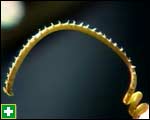 Once
you've got a whole lot of them, burn them. Don't throw them through
the compost because they'll survive, make no mistake. Once
you've got a whole lot of them, burn them. Don't throw them through
the compost because they'll survive, make no mistake.
The adults and brightly
coloured immature vegetable bugs are still around. They shrivel
up my beans and tomatoes.
It's easy to find lots
of them, and if you squash a few the others on the plant smell the
danger and drop off. They play possum — easy pickings for the
organic gardener.
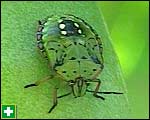 It's
the adults that overwinter, and if you grab them before they hide
away during winter and squash them, you start off with a much smaller
population for reinfestation in spring. It's
the adults that overwinter, and if you grab them before they hide
away during winter and squash them, you start off with a much smaller
population for reinfestation in spring.
Scale insects are small
suckers that are protected by a scaly cover. They live on the underside
of the leaves and along young stems, and cause honeydew and sooty
mould deposits. They're nasty suckers and they do need controlling.
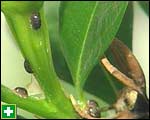 What
I use is mineral oil dissolved in water, because they're waterproof
and the oil gets under the cover and suffocates them. So give them
a good dosing. What
I use is mineral oil dissolved in water, because they're waterproof
and the oil gets under the cover and suffocates them. So give them
a good dosing.
Mealy bugs are small,
white insects that love palms and citrus and a whole lot of plants.
They have a waxy meal secretion, which makes them just like scales
— waterproof. They often hide in nooks and crannies on the
plant.
Because mealy bugs are
waterproof, I would normally control them with a really good dose
of mineral oil.
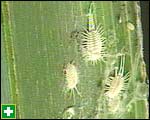 The
problem is, palms cannot stand mineral oil spray, so I have to do
something else. In this case, I've got myself some predators —
mealy bug ladybird predators. The
problem is, palms cannot stand mineral oil spray, so I have to do
something else. In this case, I've got myself some predators —
mealy bug ladybird predators.
Just let those go on
the leaf. Basically, what it's going to do is find its mealy bugs,
gobble it all up and keep the population down.
Remember, it won't exterminate
the mealy bug, because a predator will never do that.
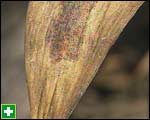 Two-spotted
spider mites occur on all sorts of plants, as long as they're in
a nice, warm condition. There's damage here. Look at the silvering
and yellow stippling on these leaves. Two-spotted
spider mites occur on all sorts of plants, as long as they're in
a nice, warm condition. There's damage here. Look at the silvering
and yellow stippling on these leaves.
What can we do against
two-spotted spider mite? Well, you can get some of the new Nature's
Way insect spray.
Alternatively, get yourself
some BioForce bean leaves with predator mites. You simply attach
the bean leaves to the infested plant with paperclips. The predator
mites will then go and eat your two-spotted spider mite.
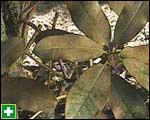 The
symptoms of thrips is silvering and bronzing on the leaf surface.
Adults and nymphs are easy to find, and you can control them with
neem oil, three or four sprays every five days. The good news is
that neem does not kill the thrips' natural predators and parasites. The
symptoms of thrips is silvering and bronzing on the leaf surface.
Adults and nymphs are easy to find, and you can control them with
neem oil, three or four sprays every five days. The good news is
that neem does not kill the thrips' natural predators and parasites.
It's handy to know that
adult thrips overwinter on fallen leaves on the ground, so pick
up all the leaves in autumn and winter and burn them. That way you
can start spring with a clean bill of health.

Reproduced
with permission from NZOOM Home and Garden content,
from the previous
website of 
The views expressed here are not necessarily those of the RNZIH
 |
|
HOME
AND GARDEN |
|
|
More
Garden Articles
|